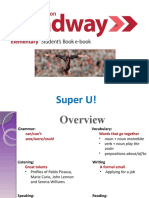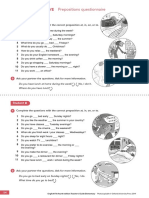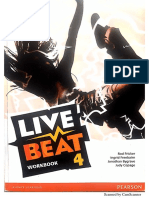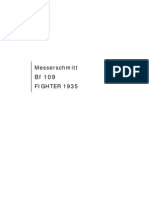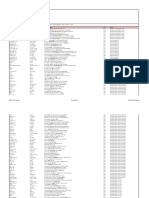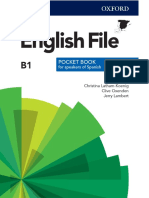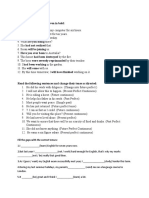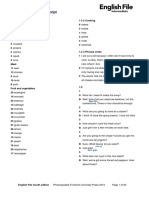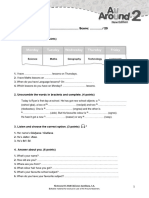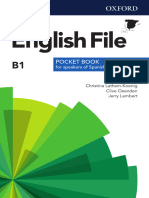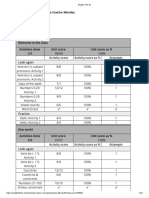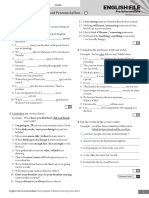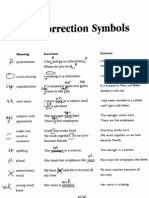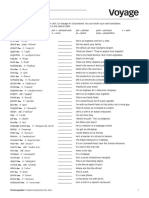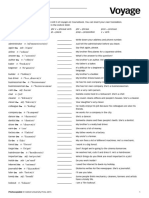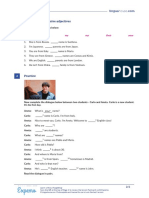Navigate A2 Unit Wordlist
Navigate A2 Unit Wordlist
Uploaded by
Lucía SánchezCopyright:
Available Formats
Navigate A2 Unit Wordlist
Navigate A2 Unit Wordlist
Uploaded by
Lucía SánchezOriginal Title
Copyright
Available Formats
Share this document
Did you find this document useful?
Is this content inappropriate?
Copyright:
Available Formats
Navigate A2 Unit Wordlist
Navigate A2 Unit Wordlist
Uploaded by
Lucía SánchezCopyright:
Available Formats
Name
A2 Wordlist Unit 1
Here is a list of useful or new words from Unit 1 of Navigate A2 Coursebook. You can insert your own translation.
Words marked with a key ( ) all appear in the Oxford 3000.
adj = adjective conj = conjunction phr v = phrasal verb phr = phrase pron = pronoun
adv = adverb n = noun pl = plural prep = preposition v = verb
American adj /əˈmerɪkən/ My boss isn’t American.
Arabic adj /ˈærəbɪk/ They’re Arabic.
artist n /ˈɑːtɪst/ She’s an artist.
aunt n /ɑːnt/ Is she your aunt?
boss n /bɒs/ My boss isn’t American, she’s Turkish.
British adj /ˈbrɪtɪʃ/ I’m from London. I’m British.
brother n /ˈbrʌðə(r)/ My brother is a doctor.
brother-in-law n /ˈbrʌðə(r) ɪn lɔː/ My brother-in-law is a doctor.
business management n He studied business management at university.
/ˌbɪznəs ˈmænɪdʒmənt/
car mechanic n /ˈkɑː məˌkænɪk/ I’m a car mechanic.
child n /tʃaɪld/ They have one child.
children n pl /ˈtʃɪldrən/ How old are your children?
Chinese adj /ˌtʃaɪˈniːz/ My neighbours are Chinese.
communicate v /kəˈmjuːnɪkeɪt/ I’m good at communicating with people.
country n /ˈkʌntri/ Which country are you from?
cousin n /ˈkʌzn/ Anna is my cousin.
daughter n /ˈdɔːtə(r)/ Their daughter is married.
designer n /dɪˈzaɪnə(r)/ She’s Australian and she’s a designer.
Emirati adj /emɪˈrɑːti/ They’re from Dubai. They’re Emirati.
family name n /ˈfæməli neɪm/ His family name’s Ramirez.
father n /ˈfɑːðə(r)/ Her father’s name is Hasan.
fluent adj /ˈfluːənt/ She’s fluent in Portuguese.
French adj /frentʃ/ My wife’s mother is French.
genetic adj /dʒəˈnetɪk/ The village doctor says it isn’t genetic; he thinks it’s something
in the water or the food.
granddaughter n /ˈɡrændɔːtə(r)/ Her granddaughter is at university.
grandfather n /ˈɡrænfɑːðə(r)/ How old is your grandfather?
grandmother n /ˈɡrænmʌðə(r)/ My grandmother is Spanish.
grandson n /ˈɡrænsʌn/ They have one grandson.
Greek adj /ɡriːk/ Are your neighbours Greek?
Hungarian adj /hʌŋˈɡeəriən/ Are you Hungarian?
husband n /ˈhʌzbənd/ My husband is Italian.
introduce v /ˌɪntrəˈdjuːs/ Let me introduce you to the other students.
Italian adj /ɪˈtæliən/ They’re Italian.
Japanese adj /ˌdʒæpəˈniːz/ My neighbours are Japanese.
last name n /ˈlɑːst neɪm/ In some countries, wives can have their husband’s last names
after they’re married.
Lebanese adj /ˌlebəˈniːz/ Are they Lebanese?
Photocopiable © Oxford University Press 2015 1
Name
A2 Wordlist Unit 1
married adj /ˈmærid/ Are you married?
Mexican adj /ˈmeksɪkən/ I’m from Mexico. I’m Mexican.
mother n /ˈmʌðə(r)/ She is the mother of six children.
nationality n /ˌnæʃəˈnæləti/ What’s your nationality?
neighbour n /ˈneɪbə(r)/ The neighbours are a family from Iraq.
nephew n /ˈnefjuː/ My nephew’s name is José.
niece n /niːs/ What’s your niece’s name?
Nigerian adj /naɪˈdʒɪəriən/ I’m from Nigeria. I’m Nigerian.
Pakistani adj /ˌpækɪˈstɑːni/ His father’s from Pakistan. He’s Pakistani.
Polish adj /ˈpəʊlɪʃ/ There’s a Polish supermarket next to our house.
Portuguese adj /ˌpɔːtʃuˈɡiːz/ Is José Portuguese?
restaurant n /ˈrestrɒnt/ I work in a restaurant.
Russian adj /ˈrʌʃn/ My neighbour is Russian.
saxophone n /ˈsæksəfəʊn/ I play the saxophone.
single adj /ˈsɪŋɡl/ Is Sylvie single?
sister n /ˈsɪstə(r)/ How old is your sister?
son n /sʌn/ I’m his son.
Spanish adj /ˈspænɪʃ/ Is Martha Spanish?
stepfather n /ˈstepfɑːðər/ Didier is my stepfather.
supermarket n /ˈsuːpəmɑːkɪt/ My Saturday job is at a Chinese supermarket called Jing Jing
Foods.
Turkish adj /ˈtɜːkɪʃ/ She isn’t American, she’s Turkish.
twin n /twɪn/ Four of their sons are twins.
typical adj /ˈtɪpɪkl/ It’s a typical village, but its people are not typical.
uncle n /ˈʌŋkl/ My uncle’s a teacher.
unemployed adj /ˌʌnɪmˈplɔɪd/ I’m unemployed at the moment.
Urdu n /ˈɜːduː/ They speak Urdu.
Vietnamese adj /ˌvjetnəˈmiːz/ She’s Vietnamese.
wife n /waɪf/ His wife’s name is Rashida.
Photocopiable © Oxford University Press 2015 2
Name
A2 Wordlist Unit 2
Here is a list of useful or new words from Unit 2 of Navigate A2 Coursebook. You can insert your own translation.
Words marked with a key ( ) all appear in the Oxford 3000.
adj = adjective conj = conjunction phr v = phrasal verb phr = phrase pron = pronoun
adv = adverb n = noun pl = plural prep = preposition v = verb
agree (with) v /əˈɡriː/ I usually agree with my friends.
alone adv /əˈləʊn/ Melanie often works there alone.
ask (for) v /ɑːsk/ Do students often ask for a discount?
astronaut n /ˈæstrənɔːt/ All astronauts in Europe learn their job at the European
Astronaut Centre in Cologne in Germany.
beach n /biːtʃ/ In the summer, I get up early and go to the beach.
body clock n /ˈbɒdi klɒk/ There is no perfect time to sleep because everyone’s body
clock is different.
break n /breɪk/ She stops for a break in the morning at quarter past eleven.
breakfast n /ˈbrekfəst/ I usually have eggs and cheese for breakfast.
canteen n /kænˈtiːn/ She has breakfast in the canteen at eight o’clock.
cereal n /ˈsɪəriəl/ I eat cereal for breakfast every morning.
class n /klɑːs/ Classes start again at half past seven.
dangerous adj /ˈdeɪndʒərəs/ Male seals are big and sometimes dangerous.
dirty adj /ˈdɜːti/ It’s dirty in the city.
discount n /ˈdɪskaʊnt/ Do students often ask for a discount?
expert n /ˈekspɜːt/ Sleep expert Dr Michael Howell says the best sleep is six hours
at night and two hours in the afternoon.
eyesight n /ˈaɪsaɪt/ Do you need perfect eyesight to be an astronaut?
feel well phr /fiːl ˈwel/ Most astronauts don’t feel well when they first go into space.
free adj /friː/ Tea and coffee are free at work.
free time n /friː ˈtaɪm/ He works very hard and he hardly ever has free time.
fresh air n /freʃ ˈeə(r)/ I prefer to live in the country because of the fresh air.
get up phr v /ɡet ˈʌp/ I get up at about seven o’clock.
go v /ɡəʊ/ I go to work at eight o’clock.
go clubbing phr /gəʊ ˈklʌbɪŋ/ We go clubbing every weekend.
half past phr /ˈhɑːf pɑːst/ Classes finish at half past six in the evening.
have dinner phr /hæv ˈdɪnə(r)/ We usually have dinner at 7 p.m.
have lunch phr /hæv ˈlʌntʃ/ I always have lunch at 12.30.
hungry adj /ˈhʌŋɡri/ I am always hungry during the day.
idea n /aɪˈdɪə/ We sometimes have different ideas.
journey n /ˈdʒɜːni/ How was your journey?
lab n /læb/ He works in the lab every afternoon.
late adj /leɪt/ My sister never waits for people who are late.
listen v /ˈlɪsn/ Gregorja listens to pop and classical music.
meeting n /ˈmiːtɪŋ/ I’d like to talk to you before the meeting tomorrow.
noisy adj /ˈnɔɪzi/ City life is sometimes noisy.
outside prep /aʊtˈsaɪd/ I often have lunch outside a café or a restaurant.
Photocopiable © Oxford University Press 2015 1
Name
A2 Wordlist Unit 2
pay v /peɪ/ Do you pay for tea and coffee at work?
penguin n /ˈpeŋɡwɪn/ Melanie Szabo studies penguins.
perfect adj /ˈpɜːfɪkt/ His English is perfect.
physics n /ˈfɪzɪks/ In the mornings, we study things like physics.
plan n /plæn/ Thanks, but I’m afraid I have plans for tonight.
professor n /prəˈfesə(r)/ Melanie Szabo is a professor.
public transport n /ˌpʌblɪk ˈtrænspɔːt/ What time does public transport stop?
quarter past phr /ˈkwɔːtə pɑːst/ He stops for a break in the morning at quarter past ten.
quarter to phr /ˈkwɔːtə tə/ She goes to morning classes at quarter to nine.
read v /riːd/ In my free time I like to listen to music or read a book.
reply n /rɪˈplaɪ/ Do we have a reply from them?
rise v /raɪz/ The sun rises at about half past five in the morning.
sandwich n /ˈsænwɪtʃ/ We buy sandwiches at lunchtime.
scientific adj /ˈsaɪənˈtɪfɪk/ Bird Island is an important scientific research centre.
scientist n /ˈsaɪəntɪst/ Every year lots of scientists visit the island.
seal n /siːl/ Sven Olafsson studies seals.
shop n /ʃɒp/ The shops open at half past eight in the morning.
shower n /ˈʃaʊə(r)/ I sometimes have a shower in the morning.
sickness n /ˈsɪknəs/ They often have space sickness.
sleeping bag n /ˈsliːpɪŋ bæɡ/ They don’t sleep in a bed – they sleep in special sleeping bags.
soup n /suːp/ They do very good Korean soup there.
space n /speɪs/ Some astronauts stay in space for over a year at a time.
spacesuit n /ˈspeɪssuːt/ Astronauts only need a spacesuit when they go on a space
walk.
start v /stɑːt/ School starts at eight o’clock in the morning.
stop v /stɒp/ Public transport usually stops at 11 o’clock at night.
student card n /ˈstjuːdnt kɑːd/ They need to show their student card.
think (about) v /ˈθɪŋk/ When he’s alone, he thinks about his friends and family.
tired adj /ˈtaɪəd/ Many of us feel tired during the day.
title n /ˈtaɪtl/ Titles and names can tell us a lot about people.
toast n /təʊst/ They usually have toast for breakfast.
trainee n /ˌtreɪˈniː/ Sanaa Diya is a trainee astronaut at the European Astronaut
Centre in Cologne.
volcano n /vɒlˈkeɪnəʊ/ He arrives at a volcano at 7 o’clock.
wait v /weɪt/ Do people often wait for buses and trains in your city?
wake up phr v /weɪk ˈʌp/ I try to wake up early, but it’s difficult.
wall n /wɔːl/ The sleeping bags are on the walls.
watch a film phr /ˌwɒtʃ ə ˈfɪlm/ We don’t often watch a film in the evening.
watch TV phr /ˌwɒtʃ tiː viː/ In the evening I usually watch TV.
work v /wɜː(r)k/ Sven never works alone.
zoology n /zuˈɒlədʒi/ She is a professor of zoology.
Photocopiable © Oxford University Press 2015 2
Name
A2 Wordlist Unit 3
Here is a list of useful or new words from Unit 3 of Navigate A2 Coursebook. You can insert your own translation.
Words marked with a key ( ) all appear in the Oxford 3000.
adj = adjective conj = conjunction phr v = phrasal verb phr = phrase pron = pronoun
adv = adverb n = noun pl = plural prep = preposition v = verb
address n /əˈdres/ Write down your address and phone number.
administrator n /ədˈmɪnɪstreɪtə(r)/ Just tell the administrator before you leave.
again adv /əˈɡen/ Say that again, please.
airline n /ˈeəlaɪn/ My brother flies planes for a Japanese airline.
answer n /ˈɑːnsə(r)/ What’s the answer to this question?
author n /ˈɔːθə(r)/ His brother’s an author. He’s writing a book at the moment.
baker n /ˈbeɪkə(r)/ His father’s a baker.
beginner n /bɪˈɡɪnə(r)/ It’s difficult for a beginner to understand very much in a new
language.
builder n /ˈbɪldə(r)/ My brother’s a builder.
bus driver n /ˈbʌs ˌdraɪvə(r)/ My brother drives buses in the city. He’s a bus driver.
businessman n /ˈbɪznəsmæn/ He has his own company. He’s a businessman.
businesswoman n /ˈbɪznəswʊmən/ She has her own company. She’s a businesswoman.
calm adj /kɑːm/ He’s a very calm person.
chef n /ʃef/ Daniela cooks food in a restaurant. She’s a chef.
cleaner n /ˈkliːnə(r)/ My cousin cleans offices and people’s houses. She’s a cleaner.
clever adj /ˈklevə(r)/ Your daughter’s very clever.
colleague n /ˈkɒliːɡ/ He really enjoys his job because his colleagues are also his
friends.
company n /ˈkʌmpəni/ He works for a company in the city.
dancer n /ˈdɑːnsə(r)/ She’s a dancer.
dentist n /ˈdentɪst/ Sameeha cleans and fixes people’s teeth. She’s a dentist.
driver n /ˈdraɪvə(r)/ My brother’s a really bad driver.
earn v /ɜːn/ She earns a lot of money.
factory n /ˈfæktri/ My father works in a factory.
farmer n /ˈfɑːmə(r)/ My uncle’s a farmer.
fix v /fɪks/ My son fixes a lot of different machines. He’s a mechanic.
forest n /ˈfɒrɪst/ I work in a big forest.
forget v /fəˈɡet/ Don’t forget we’re going to the cinema tomorrow.
hairdresser n /ˈheədresə(r)/ He washes hair, cuts it and dries it. He’s a hairdresser.
important adj /ɪmˈpɔːtnt/ Which things do you think are most important in a job?
inside adv /ˌɪnˈsaɪd/ Do you work inside?
internet n /ˈɪntənet/ I used the internet to book my holiday.
journalist n /ˈdʒɜːnəlɪst/ Ekaterina writes for the newspaper. She’s a journalist.
later adv /ˈleɪtə(r)/ I’ll see you later.
lonely adj /ˈləʊnli/ Some people think mechanics, cleaners, farmers and artists
have a lonely life.
lookout n /ˈlʊkaʊt/ I am a ‘fire lookout’.
Photocopiable © Oxford University Press 2015 1
Name
A2 Wordlist Unit 3
lucky adj /ˈlʌki/ And who are these lucky people?
magazine n /ˌmæɡəˈziːn/ My mother is a journalist and she works for a fashion magazine.
manager n /ˈmænɪdʒə(r)/ She works in an office. She’s a manager.
money n /ˈmʌni/ She makes a lot of money.
MP3 player n /ˌem piː ˈθriː ˌpleɪə(r)/ It’s an MP3 player.
musician n /mjuˈzɪʃn/ My cousin sings and plays the guitar in a band. She’s a musician.
nurse n /nɜːs/ She works in a hospital and helps sick people. She’s a nurse.
office worker n /ˈɒfɪs ˌwɜːkə(r)/ They say that office workers are happy because they usually
work as part of a team.
painter n /ˈpeɪntə(r)/ My uncle is a painter.
part-time adv /ˌpɑːt ˈtaɪm/ My grandmother works part-time as a cleaner.
photographer n /fəˈtɒɡrəfə(r)/ Manu takes pictures with his camera. He’s a photographer.
piano n /piˈænəʊ/ I play the piano at a cinema in town.
pilot n /ˈpaɪlət/ My brother flies planes. He’s a pilot.
place of work n /ˌpleɪs əv ˈwɜːk/ I think your place of work is very important.
police officer n /pəˈliːs ˌɒfɪsə(r)/ Serena catches criminals and makes people feel safe. She’s a
police officer.
retired adj /rɪˈtaɪəd/ My parents are both retired.
salary n /ˈsæləri/ His salary is really good. He earns a lot of money.
silent adj /ˈsaɪlənt/ At my cinema, they have a lot of old, silent movies, so they
need someone to play music.
singer n /ˈsɪŋə(r)/ She’s a singer in a band.
student n /ˈstjuːdnt/ She studies at university. She’s a student.
teacher n /ˈtiːtʃə(r)/ My sister’s a teacher.
ticket n /ˈtɪkɪt/ I work in a cinema in town, but I don’t sell tickets.
tower n /ˈtaʊə(r)/ I work in a very high tower so I can see very far.
uniform n /ˈjuːnɪfɔːm/ She hates the uniform that police officers wear.
unusual adj /ʌnˈjuːʒuəl/ Do you have an unusual job?
well-paid adj /wel ˈpeɪd/ He’s very well-paid.
winner n /ˈwɪnə(r)/ You win. You’re the winner.
work freelance phr /wɜːk ˈfriːlɑːns/ I don’t have a boss because I work freelance.
work long hours phr / wɜːk lɒŋ ˈaʊəz/ Do you work long hours?
writer n /ˈraɪtə(r)/ My cousin is a famous writer.
Photocopiable © Oxford University Press 2015 2
Name
A2 Wordlist Unit 4
Here is a list of useful or new words from Unit 4 of Navigate A2 Coursebook. You can insert your own translation.
Words marked with a key ( ) all appear in the Oxford 3000.
adj = adjective conj = conjunction phr v = phrasal verb phr = phrase pron = pronoun
adv = adverb n = noun pl = plural prep = preposition v = verb
above prep /əˈbʌv/ My bed is above the kitchen.
airport n /ˈeəpɔːt/ The roads to Coober Pedy are good and there’s an airport.
armchair n /ˈɑːmtʃeə(r)/ There’s an armchair in the living room.
bank n /bæŋk/ Where’s the bank?
bathroom n /ˈbɑːθruːm/ There’s a small bathroom in my flat.
bed n /bed/ There’s a small table next to my bed.
bedroom n /ˈbedruːm/ In my house, there are three bedrooms.
behind prep /bɪˈhaɪnd/ The East River is behind the building.
between prep /bɪˈtwiːn/ My flat’s on the fourth floor of a building between Delancey
Street and Grand Street.
big adj /bɪg/ I need a big desk to work on.
booking form n /ˈbʊkɪŋ fɔːm/ Bring the booking form with you.
bookshop n /ˈbʊkʃɒp/ There’s a bookshop opposite my flat.
building n /ˈbɪldɪŋ/ It’s a modern building.
campsite n /ˈkæmpsaɪt/ There are four or five hotels and there’s also a campsite.
capital n /ˈkæpɪtl/ Coober Pedy is the opal capital of the world.
carpet n /ˈkɑːpɪt/ There’s a red carpet on the floor.
cheap adj /tʃiːp/ My flat’s in a cheap part of town.
chemist n /ˈkemɪst/ Is there a chemist near hear?
cinema n /ˈsɪnəmə/ There’s a cinema near the hotel.
clean adj /kliːn/ I like to keep them very clean.
cooker n /ˈkʊkə(r)/ In the kitchen there’s a cooker.
dining room n /ˈdaɪnɪŋ ruːm/ There’s a dining room next to the kitchen.
dishwasher n /ˈdɪʃwɒʃə(r)/ The dishwasher is under the sink.
easy adj /ˈiːzi/ It’s easy to find a flat in my town.
expensive adj /ɪkˈspensɪv/ My computer is new and expensive.
fantastic adj /fænˈtæstɪk/ The food is fantastic.
flat n /flæt/ I live in a flat.
fridge n /frɪdʒ/ The fridge is next to the sink.
furniture n /ˈfɜːnɪtʃə(r)/ My furniture is mostly old.
garage n /ˈɡærɑːʒ, ˈɡærɪdʒ/ There’s a garage opposite my flat.
hairdresser’s n /ˈheədresəz/ In the hotel, there is a swimming pool, a hairdresser’s and
ninety-five bedrooms.
hospital n /ˈhɒspɪtl/ She works in a hospital.
housemate n /ˈhaʊsmeɪt/ My housemates are very messy.
in front of prep /ˌɪn ˈfrʌnt əv/ It’s on the floor in front of the window.
instructions n pl /ɪnˈstrʌkʃnz/ Here are the instructions.
kitchen n /ˈkɪtʃɪn/ There’s a small kitchen in my flat.
launderette n /lɔːnˈdret/ I go to the launderette to wash my clothes.
Photocopiable © Oxford University Press 2015 1
Name
A2 Wordlist Unit 4
lazy adj /ˈleɪzi/ They are very lazy.
library n /ˈlaɪbrəri/ Excuse me, where’s the library?
light adj /laɪt/ There are lots of windows, so it’s very light.
living room n /ˈlɪvɪŋ ruːm/ In my flat, there is a living room.
market n /ˈmɑːkɪt/ It’s behind the market.
messy adj /ˈmesi/ I’m a messy worker.
mine n /maɪn/ A lot of the people in Coober Pedy work in the opal mines.
museum n /mjuˈziːəm/ There’s a museum about the history of the town.
next to prep /ˈnekst tuː, tə/ It’s next to a restaurant.
old adj /əʊld/ I live in an old town.
old-fashioned adj /ˌəʊːld ˈfæʃnd/ My house is very old-fashioned.
on prep /ɒn/ My bed is on a shelf.
opal n /ˈəʊpl/ Near Coober Pedy, there are opals under the ground.
opposite prep /ˈɒpəzɪt/ The building is opposite a 24-hour garage.
organized adj /ˈɔːɡənaɪzd/ I work from home, so I keep everything tidy and organized.
palace n /ˈpæləs/ It’s next to the palace.
passport n /ˈpɑːspɔːt/ You usually need your passport to travel from here.
post office n /ˈpəʊst ˌɒfɪs/ Where’s the post office?
railway station n /ˈreɪlweɪ ˌsteɪʃn/ There isn’t a railway station.
scarf n /skɑːf/ Take a hat or scarf to wear on your head.
shelf n /ʃelf/ My bed is on a shelf above the kitchen.
sink n /sɪŋk/ In the kitchen, there’s a sink.
studio flat n /ˈstjuːdiəʊ flæt/ I live in a studio flat.
swimming pool n /ˈswɪmɪŋ puːl/ There’s an underground swimming pool.
table n /ˈteɪbl/ There’s a table next to the armchair.
temple n /ˈtempl/ Please don’t take photographs inside the temple.
terrible adj /ˈterəbl/ It’s a terrible restaurant.
theatre n /ˈθɪətə(r)/ Is there a theatre in Coober Pedy?
tidy adj /ˈtaɪdi/ Are you a tidy person?
toilet n /ˈtɔɪlət/ There’s a toilet next to the bedroom.
tour n /tɔː(r)/ These are the instructions for tomorrow’s tour.
tourist n /ˈɔːrɪst/ There aren’t any tourists there.
tourist information centre n There’s a big tourist information centre.
/ˌtɔːrɪst ˌɪnfəˈmeɪʃn ˌsentə(r)/
town n /taʊn/ There are some nice restaurants in the town centre.
travel v /ˈtrævl/ You need a passport to travel there.
ugly adj /ˈʌɡli/ It’s an ugly building.
under prep /ˈʌndə(r)/ The toilet and shower are under the shelf.
underground adj /ˌʌndəˈɡraʊnd/ Are there any underground buildings we can visit?
visit v /ˈvɪzɪt/ So can people visit the place?
washing machine n /ˈwɒʃɪŋ məˌʃiːn/ There isn’t a washing machine in my flat.
window n /ˈwɪndəʊ/ There’s a table under the window.
Photocopiable © Oxford University Press 2015 2
Name
A2 Wordlist Unit 5
Here is a list of useful or new words from Unit 5 of Navigate A2 Coursebook. You can insert your own translation.
Words marked with a key ( ) all appear in the Oxford 3000.
adj = adjective conj = conjunction phr v = phrasal verb phr = phrase pron = pronoun
adv = adverb n = noun pl = plural prep = preposition v = verb
baker’s n /ˈbeɪkəz/ I buy bread from the baker’s.
boring adj /ˈbɔːrɪŋ/ I don’t like shopping. It’s boring.
butcher’s n /ˈbʊtʃəz/ I buy meat from the butcher’s.
button n /ˈbʌtn/ I choose a pair, press a button and the mirror shows me
wearing them.
careful adj /ˈkeəfl/ Be careful!
carefully adv /ˈkeəfəli/ I try to spend my money carefully.
cash n /kæʃ/ I pay for things with cash.
changing room n /ˈtʃeɪndʒɪŋ ruːm/ The changing rooms are on the right.
clear adj /klɪə(r)/ The water is very clear.
clearly adv /ˈklɪəli/ I can’t read that sign clearly.
coat n /kəʊt/ She’s wearing a coat and has a big scarf round her neck.
correct adj /kəˈrekt/ I got all the answers correct.
correctly adv /kəˈrektli/ Maria answers every question correctly.
dangerously adv /ˈdeɪndʒərəsli/ You’re driving dangerously.
designer shoes n pl /dɪˌzaɪnə ˈʃuːz/ She is also wearing designer shoes.
disappointed adj /ˌdɪsəˈpɔɪntɪd/ I’m very disappointed with this product.
dress n /dres/ She is wearing a blue dress.
gloves n pl /ɡlʌvz/ She has a hat on her head and gloves on her hands.
good adj /ɡʊd/ He’s very good at languages.
great adj /ɡreɪt/ It’s great value.
hat n /hæt/ She is wearing a hat.
heavy adj /ˈhevi/ It’s big and very heavy.
hoodie n /ˈhʊdi/ She is wearing a hoodie.
information n /ˌɪnfəˈmeɪʃn/ Customers can’t ask for information like they could in the past.
jacket n /ˈdʒækɪt/ I am wearing a blue jacket today.
jeans n pl /dʒiːnz/ Leila is wearing jeans.
jewellery n /ˈdʒuːəlri/ She is wearing gold jewellery.
meat n /miːt/ Where do you buy meat from?
newsagent’s n /ˈnjuːzeɪdʒənts/ I buy magazines and newspapers from the newsagent’s.
online adv /ɒnˈlaɪn/ I do a lot of my shopping online.
poor adj /pɔː(r)/ It’s very poor value.
postcard n /ˈpəʊstkɑːd/ The first vending machines were in London in the 1880s and
they sold postcards.
quiet adj /ˈkwaɪət/ She’s very quiet.
quietly adv /ˈkwaɪətli/ Why are you talking so quietly?
rainwater n /ˈreɪnwɔːtə(r)/ Can you buy a bottle of rainwater for $11 these days?
reading glasses n pl /ˈriːdɪŋ ˌɡlɑːsɪz/ She is wearing her reading glasses.
Photocopiable © Oxford University Press 2015 1
Name
A2 Wordlist Unit 5
receipt n /rɪˈsiːt/ Would you like a receipt?
recommend v /ˌrekəˈmend/ I recommend it to everyone.
relax v /rɪˈlæks/ Leila and Mike are relaxing at home.
return v /rɪˈtɜːn/ When I buy something I don’t like, I return it to the shop.
sales n pl /seɪlz/ I stand outside and wait for the shops to open on the first day
of the sales.
serious adj /ˈsɪəriəs/ It can make you look serious and important.
shopping centre n /ˈʃɒpɪŋ ˌsentə(r)/ I buy things from a shopping centre. I prefer them to small
shops.
shorts n pl /ʃɔːts/ Mike is wearing shorts.
simple adj /ˈsɪmpl/ I enjoy a simple life.
skirt n /skɜːt/ Anita is wearing a skirt and top.
slow adj /sləʊ/ Why is this train so slow?
slowly adv /ˈsləʊli/ The train is moving very slowly.
socks n pl /sɒks/ He is wearing socks.
spend v /spend/ I spend a lot of money at the weekends.
strong adj /strɒŋ/ You are probably a strong person and you always try hard at
everything you do.
suit n /suːt/ Paul is wearing a suit.
tie n /taɪ/ I am wearing a tie.
trainers n pl /ˈtreɪnəz/ He is wearing trainers.
trousers n pl /ˈtraʊzəz/ The trousers are the same colour as the jacket.
T-shirt n /ˈtiː ʃɜːt/ Mike is wearing shorts and a T-shirt.
umbrella n /ʌmˈbrelə/ She’s carrying an umbrella.
value n /ˈvæljuː/ It’s great value.
vending machine n /ˈvendɪŋ məˌʃiːn/ Can you buy eggs from a vending machine?
virtual adj /ˈvɜːtʃuəl/ I’m here today to try the ‘virtual mirror’.
wedding n /ˈwedɪŋ/ She is at a wedding.
well adv /wel/ She writes well.
worth adj /wɜːθ/ It’s definitely not worth the money.
Photocopiable © Oxford University Press 2015 2
Name
A2 Wordlist Unit 6
Here is a list of useful or new words from Unit 6 of Navigate A2 Coursebook. You can insert your own translation.
Words marked with a key ( ) all appear in the Oxford 3000.
adj = adjective conj = conjunction phr v = phrasal verb phr = phrase pron = pronoun
adv = adverb n = noun pl = plural prep = preposition v = verb
a bit phr /ə ˈbɪt/ As you get closer, you notice something a bit unusual.
believe v /bɪˈliːv/ They decided to make metal snakes and use them as money.
They believed their snake money helped them to stay safe.
bobsleigh n /ˈbɒbsleɪ/ People were surprised to see a bobsleigh team from Jamaica.
call v /kɔːl/ His boss called the owner of the bag.
change v /tʃeɪndʒ/ That all changed in the 1990s.
classroom n /ˈklɑːsruːm/ The classroom is cold today.
collect v /kəˈlekt/ The owner was very happy when he collected his lost money.
copy v /ˈkɒpi/ She copied him.
decide v /dɪˈsaɪd/ Bernardo Paz decided to use the space for something very
different.
fashion designer n /ˈfæʃn dɪˌzaɪnə(r)/ She decided to become a fashion designer.
finish v /ˈfɪnɪʃ/ He finished work at 2 a.m.
founder n /ˈfaʊndə(r)/ He was the founder of Sony.
ice skater n /ˈaɪs ˌskeɪtə(r)/ When she was younger she was a very good ice skater.
interesting adj /ˈɪntrəstɪŋ/ The sculptures were very interesting.
label n /ˈleɪbl/ She has her own fashion label.
like v /laɪk/ The Ancient Egyptians liked wearing their money on their
fingers as rings.
live v /lɪv/ The Lobi people of Ancient Ghana in Africa lived as farmers.
look v /lʊk/ When he looked between the seats, he noticed a bag.
love v /lʌv/ They loved it.
modern art n /ˌmɒdn ˈɑːt/ Modern art is really boring.
move v /muːv/ When was the last time you moved house?
naughty adj /ˈnɔːti/ My son was very naughty.
notice v /ˈnəʊtɪs/ He noticed a bag between the seats.
open v /ˈəʊpən/ She opened the window.
play v /pleɪ/ I played football when I was a child.
popular adj /ˈpɒpjələ(r)/ They were very popular with the people watching because
they tried so hard.
post v /pəʊst/ When was the last time you posted a letter?
prepare v /prɪˈpeə(r)/ When was the last time you prepared a meal?
product n /ˈprɒdʌkt/ Their first product was an electric rice cooker.
quite adv /kwaɪt/ It is quite far from the usual tourist spots of Brazil.
really adv /ˈriːəli/ It is really important for the local area.
receive v /rɪˈsiːv/ When was the last time you received an email?
return v /rɪˈtɜːn/ He returned the money to his boss.
sculpture n /ˈskʌlptʃə(r)/ I thought the sculptures in the park were a bit boring.
Photocopiable © Oxford University Press 2015 1
Name
A2 Wordlist Unit 6
shout v /ʃaʊt/ When was the last time you shouted at someone?
start v /stɑːt/ He started to clean his cab.
study v /ˈstʌdi/ He studied for his exams yesterday.
successful adj /səkˈsesfl/ Today, she is very successful.
talk v /tɔːk/ They talked a lot about the football match.
thank v /θæŋk/ He thanked Adam and gave him $2,000.
use v /juːz/ In the end, I used my ordinary shoes.
very adv /ˈveri/ Bernardo Paz decided to use the space for something very
different.
want v /wɒnt/ We wanted it.
watch v /wɒtʃ/ She watched them playing tennis.
Photocopiable © Oxford University Press 2015 2
Name
A2 Wordlist Unit 7
Here is a list of useful or new words from Unit 7 of Navigate A2 Coursebook. You can insert your own translation.
Words marked with a key ( ) all appear in the Oxford 3000.
adj = adjective conj = conjunction phr v = phrasal verb phr = phrase pron = pronoun
adv = adverb n = noun pl = plural prep = preposition v = verb
app n /æp/ I watched a programme about apps.
athletics n /æθˈletɪks/ When he was a young boy, Usain Bolt did athletics all the time.
ban v /bæn/ He banned smoking in public places.
basketball n /ˈbɑːskɪtbɔːl/ I play basketball with my friends.
borrow v /ˈbɒrəʊ/ I forgot my pen, so I borrowed one from my classmate.
bring v /brɪŋ/ Can you bring me my glasses?
bucket n /ˈbʌkɪt/ He put his hand in a bucket of ice.
come v /kʌm/ Why don’t you come to my house for dinner tomorrow?
cycle v /ˈsaɪkl/ I usually cycle to work.
do v /duː/ Do an hour of exercise each day.
drink v /drɪŋk/ Drink eight glasses of water a day.
eat v /iːt/ Eat lots of fruit and vegetables.
fit adj /fɪt/ I cycle every day to keep fit.
football n /ˈfʊtbɔːl/ They’re playing football in the park.
gadget n /ˈɡædʒɪt/ The programme was about apps and gadgets that check our
health and daily exercise.
go fishing phr /ɡəʊ ˈfɪʃɪŋ/ I like to go fishing with my uncle.
gym n /dʒɪm/ How often do you go to the gym?
habit n /ˈhæbɪt/ Bloomberg tried to change their habits.
healthy adj /ˈhelθi/ Michael Bloomberg wanted the people of New York to be
healthy.
hero n /ˈhɪərəʊ/ They want to be like their heroes.
jog v /dʒɒɡ/ I jog every morning.
judo n /ˈdʒuːdəʊ/ We do judo every Wednesday after work.
learn v /lɜːn/ I do sport to learn something new.
lend v /lend/ Can you lend me £10?
lift n /lɪft/ He told them he always took the stairs, not the lift.
lightning n /ˈlaɪtnɪŋ/ Lightning didn’t hit him, but there was lightning in the sky.
local adj /ˈləʊkl/ He played for his local team.
lose v /luːz/ I go swimming to lose weight.
marathon n /ˈmærəθən/ He ran the Toronto marathon and became the first person aged
100 years old to finish a marathon.
mayor n /meə(r)/ In 2002, New York City chose a new mayor.
opinion n /əˈpɪnjən/ What’s your opinion, Jan?
paper clip n /ˈpeɪpə klɪp/ The first group took more paper clips.
physical adj /ˈfɪzɪkl/ Do physical jobs around the house.
progress n /ˈprəʊɡres/ They met again to talk about their progress.
reduce v /rɪˈdjuːs/ He also tried to reduce the size of sweet drinks.
Photocopiable © Oxford University Press 2015 1
Name
A2 Wordlist Unit 7
research n /rɪˈsɜːtʃ/ New research shows that video gamers don’t live in the real
world.
ride v /raɪd/ Ride a bicycle.
routine n /ruːˈtiːn/ New gadgets and technology can help us change our routine
and get more healthy.
run v /rʌn/ Fauja didn’t run marathons when he was young.
sleep v /sliːp/ Sleep seven to eight hours a night.
studio n /ˈstjuːdiəʊ/ Jan Hamilton and Sara White, two local parents, are in the
studio with me to discuss this.
subtitle n /ˈsʌbtaɪtl/ How often do you watch films in English without reading the
subtitles?
swim v /swɪm/ I swim every Saturday morning.
take v /teɪk/ Take the stairs, not the lift.
tennis n /ˈtenɪs/ People play tennis in my local park.
thunderstorm n /ˈθʌndəstɔːm/ There was a thunderstorm during the 100m World
Championship final in 2013.
violent adj /ˈvaɪələnt/ Some video games aren’t OK for children because they’re very
violent.
walk v /wɔːk/ Walk to work.
win v /wɪn/ She always wins when she plays tennis.
yoga n /ˈjəʊɡə/ I do yoga every Thursday morning.
Photocopiable © Oxford University Press 2015 2
Name
A2 Wordlist Unit 8
Here is a list of useful or new words from Unit 8 of Navigate A2 Coursebook. You can insert your own translation.
Words marked with a key ( ) all appear in the Oxford 3000.
adj = adjective conj = conjunction phr v = phrasal verb phr = phrase pron = pronoun
adv = adverb n = noun pl = plural prep = preposition v = verb
air-conditioned adj /ˈeə kənˌdɪʃnd/ Air-conditioned taxis are a comfortable way to travel.
amazing adj /əˈmeɪzɪŋ/ India is amazing!
apartment n /əˈpɑːtmənt/ Do you prefer to stay in a hotel or rent an apartment?
art gallery n /ˈɑːt ˌɡæləri/ I enjoy visiting all the art galleries and museums.
bike n /baɪk/ I go to work by bike. It’s great exercise.
bus n /bʌs/ I get the bus to work.
car n /kɑː(r)/ I go to work by car and it takes about an hour.
city break n /ˈsɪti ˌbreɪk/ I prefer going on a city break.
colourful adj /ˈkʌləfl/ Everywhere is really colourful and interesting.
countryside n /ˈkʌntrisaɪd/ Do you like staying in the countryside?
culture n /ˈkʌltʃə(r)/ For me, holidays are about culture.
dinner n /ˈdɪnə(r)/ Who do you usually have dinner with?
employee n /ɪmˈplɔɪiː/ Indian railways have about a million employees.
environment n /ɪnˈvaɪrənmənt/ Cyclos are a fun way to get around and they’re good for the
environment.
get v /ɡet/ How often do you get a taxi to go somewhere?
get around phr v /ɡet əˈraʊnd/ How do you usually get around town?
group n /ɡruːp/ I like going on holiday with a group of friends.
guest house n /ˈɡest haʊs/ We usually stay in a guest house.
guide n /ɡaɪd/ Sometimes I go on a tour with a guide, because it’s a great way
to learn about a place.
helmet n /ˈhelmɪt/ Your driver has to give you a helmet and you have to wear it.
hold v /həʊld/ You should hold the driver so you don’t fall off!
lie v /laɪ/ Do you like lying on the beach?
map n /mæp/ Do you usually take a map or do you get lost?
miss v /mɪs/ Did you miss your bus?
mountain n /ˈmaʊntən/ We prefer to stay in the mountains.
passenger n /ˈpæsɪndʒə(r)/ 25 million passengers travel on 11,000 trains every day in India.
platform n /ˈplætfɔːm/ Which platform does it leave from?
queue n /kjuː/ You have to stand in a queue.
railway n /ˈreɪlweɪ/ What can you tell me about Indian railways?
rainforest n /ˈreɪnfɒrɪst/ The ruins are in the middle of a rainforest and they’re really
beautiful.
rent v /rent/ I normally rent an apartment by the sea.
return n /rɪˈtɜːn/ Would you like a single or return?
ruins n pl /ˈruːɪnz/ My favourite thing was the ruins of a Mayan city in Tikal.
seat belt n /ˈsiːt belt/ You don’t have to wear a seat belt for the whole journey on a
plane.
Photocopiable © Oxford University Press 2015 1
Name
A2 Wordlist Unit 8
sightseeing n /ˈsaɪtsiːɪŋ/ We don’t go sightseeing.
single n /ˈsɪŋɡl/ Just a single, please.
street life n /ˈstriːt laɪf/ We think it’s the best way to see the street life of the city.
sunrise n /ˈsʌnraɪz/ I climbed to the top of a temple at sunrise.
taxi n /ˈtæksi/ Sometimes I miss my train, so I have to get a taxi.
text message n /ˈtekst ˌmesɪdʒ/ How many text messages do you get?
tip n /tɪp/ You don’t have to leave a tip in restaurants.
tradition n /trəˈdɪʃn/ I don’t know why they do it, it’s just a tradition.
train n /treɪn/ Sometimes I get up late and I miss my train.
trek v /trek/ We like to trek in the mountains.
Photocopiable © Oxford University Press 2015 2
Name
A2 Wordlist Unit 9
Here is a list of useful or new words from Unit 9 of Navigate A2 Coursebook. You can insert your own translation.
Words marked with a key ( ) all appear in the Oxford 3000.
adj = adjective conj = conjunction phr v = phrasal verb phr = phrase pron = pronoun
adv = adverb n = noun pl = plural prep = preposition v = verb
bake v /beɪk/ Do you bake your own bread?
beef n /biːf/ I’d like some beef, please.
boil v /bɔɪl/ I always boil my vegetables.
bowl n /bəʊl/ Put all the ingredients into a bowl.
bread n /bred/ Not many people bake their own bread these days.
castle n /ˈkɑːsl/ Can you see the castle from here?
chicken n /ˈtʃɪkɪn/ Could I have the grilled chicken?
chop v /tʃɒp/ Can you chop the onions with this knife, please?
cube n /kjuːb/ Can I have some beef cubes?
delicious adj /dɪˈlɪʃəs/ That looks delicious, but what is it?
food processor n /ˈfuːd ˌprəʊsesə(r)/ Put everything in the food processor for one minute to make
the soup.
fork n /fɔːk/ There are knives and forks on the table.
fruit n /fruːt/ We both had fruit and yoghurt for breakfast this morning.
fry v /fraɪ/ For breakfast, I often fry bacon, eggs and mushrooms.
frying pan n /ˈfraɪɪŋ pæn/ I have one frying pan and two saucepans.
honey n /ˈhʌni/ I have honey and yoghurt for breakfast.
ingredient n /ɪnˈɡriːdiənt/ Have you bought the ingredients for the meal?
jam n /dʒæm/ Do you have any jam?
kettle n /ˈketl/ You boil water in a kettle to make tea.
knife n /naɪf/ You need a sharp knife to chop the onions.
lemon n /ˈlemən/ There are only 17 calories in a lemon.
lemonade n /ˌleməˈneɪd/ Can I have a bottle of lemonade?
main course n /ˈmeɪn kɔːs/ Could I have the grilled chicken for the main course?
microwave n /ˈmaɪkrəweɪv/ The most important thing in my kitchen is the microwave.
mix v /mɪks/ Mix all the ingredients together.
mushroom n /ˈmʌʃrʊm/ Do you have any mushrooms?
noodles n /ˈnuːdlz/ It comes with some noodles.
olive n /ˈɒlɪv/ I’d like some olives instead, please.
oven n /ˈʌvn/ The oven is very hot.
pasta n /ˈpæstə/ We can have pasta any day.
pear n /peə(r)/ I’d like a pear.
plate n /pleɪt/ I have a beautiful old set of plates and bowls for when people
come for dinner.
prepare v /prɪˈpeə(r)/ The average American family today spends just 27 minutes a
day preparing meals.
ready-made adj /ˌredi ˈmeɪd/ A lot of people buy ready-made meals.
rice n /raɪs/ We have some rice.
Photocopiable © Oxford University Press 2015 1
Name
A2 Wordlist Unit 9
roast v /rəʊst/ To roast meat, you need a very hot oven.
rooftop adj /ˈruːftɒp/ There are wonderful views of the city from the rooftop
restaurant.
salad n /ˈsæləd/ Can I have some salad with that as well, please?
saucepan n /ˈsɔːspən/ I’ve got three saucepans in my kitchen.
secret n /ˈsiːkrət/ What is the secret to good health?
spoon n /spuːn/ Mix the water and flour together in a bowl with a spoon.
starter n /ˈstɑːtə(r)/ Would you like a starter?
survey n /ˈsɜːveɪ/ According to a survey, 49% of 18–24-year-olds don’t know how
many minutes it takes to boil an egg!
sweet adj /swiːt/ This jam is very sweet.
sweetcorn n /ˈswiːtkɔːn/ Can I have some sweetcorn?
takeaway food n /ˈteɪkəweɪ fuːd/ When we buy takeaway food, we don’t really think about what
we’re eating.
unhealthy adj /ʌnˈhelθi/ That’s an unhealthy meal.
vegetable n /ˈvedʒtəbl/ The chicken comes with vegetables or salad.
view n /vjuː/ There’s a nice view of the castle.
wonderful adj /ˈwʌndəfl/ It has a wonderful menu.
yoghurt n /ˈjɒɡət/ I have yoghurt for breakfast.
Photocopiable © Oxford University Press 2015 2
Name
A2 Wordlist Unit 10
Here is a list of useful or new words from Unit 10 of Navigate A2 Coursebook. You can insert your own translation.
Words marked with a key ( ) all appear in the Oxford 3000.
adj = adjective conj = conjunction phr v = phrasal verb phr = phrase pron = pronoun
adv = adverb n = noun pl = plural prep = preposition v = verb
accent n /ˈæksent/ She’s got a really strong accent.
blow v /bləʊ/ The wind is blowing really hard.
busy adj /ˈbɪzi/ The busiest airport of the three is Beijing, then Dubai and then
Los Angeles.
camp n /kæmp/ You are going to walk 10km from the main camp.
climate n /ˈklaɪmət/ Siberia has a very cold climate.
close adj /kləʊs/ He’s a close friend of mine.
cloudy adj /ˈklaʊdi/ It’s going to be cloudy this afternoon.
coast n /kəʊst/ There are some beautiful beaches near the west coast of
Thailand.
compass n /ˈkʌmpəs/ I think a map and compass are the most useful things.
crazy adj /ˈkreɪzi/ People do some crazy things!
deep adj /diːp/ Lake Baikal is more than 600 metres deep.
desert n /ˈdezət/ It’s a cold desert because it’s so far north and it sometimes
snows there.
dry adj /draɪ/ It’s dry this morning.
east n /iːst/ The east of the country is quite cold.
equipment n /ɪˈkwɪpmənt/ The runners have to carry their food and equipment.
first-aid kit n /fɜːst ˈeɪd kɪt/ What happens if we need the first-aid kit?
foggy adj /ˈfɒɡi/ It’s cold and foggy.
freeze v /friːz/ It’s so cold. We’re going to freeze if we go outside.
freezing adj /ˈfriːzɪŋ/ It’s freezing here today.
hard worker n /hɑːd ˈwɜːkə(r)/ He’s a really hard worker.
high adj /haɪ/ Did you have a high score in your last test?
hot adj /hɒt/ It’s the hottest time of the year.
icy adj /ˈaɪsi/ The roads are very icy.
island n /ˈaɪlənd/ The Andaman Sea has some very beautiful tropical islands and
white sandy beaches near the west coast of Thailand.
jungle n /ˈdʒʌŋɡl/ The Amazon jungle is the biggest area of rainforest in the world.
lake n /leɪk/ It’s the biggest and deepest lake in the world.
large adj /ˈlɑːdʒ/ Mount Kilimanjaro is one of the largest volcanoes in the world.
lighter n /ˈlaɪtə(r)/ I think a lighter is more important than a stove.
low adj /ləʊ/ Which jobs usually have the lowest salaries?
mild adj /maɪld/ They have mild weather on the island.
north n /nɔːθ/ There are more mountains in the north.
oasis n /əʊˈeɪsɪs/ Al Hasa is the largest oasis in Saudi Arabia.
rain n /reɪn/ It’s cloudy this morning but dry, so we don’t expect any rain.
rainy adj /ˈreɪni/ It’s cloudy and rainy here today.
Photocopiable © Oxford University Press 2015 1
Name
A2 Wordlist Unit 10
river n /ˈrɪvə(r)/ Which river is the longest in the world?
sandy adj /ˈsændi/ There are lots of beautiful sandy beaches on the coast.
score n /skɔː(r)/ He got a low score in the test.
shine v /ʃaɪn/ The sun is going to shine all afternoon.
sleeper n /ˈsliːpə(r)/ He’s a light sleeper.
snow n /snəʊ/ There was a lot of snow last night.
snowy adj /ˈsnəʊi/ It’s cold and snowy here this morning.
south n /saʊθ/ The best beaches are in the south.
storm n /stɔːm/ There was a big storm.
stove n /stəʊv/ I think we should take one stove instead of three.
sunny adj /ˈsʌni/ By the afternoon, it’s going to be warm and sunny but not
really hot.
survival n /səˈvaɪvl/ The survival camp is in the rainforest next to the river.
survive v /səˈvaɪv/ You need to survive for three days and two nights and find
your way back to the main camp.
temperature n /ˈtemprətʃə(r)/ By the afternoon, it’s going to be warm and sunny but not
really hot, with temperatures of around 20 degrees Celsius.
tent n /tent/ You can take a tent and a sleeping bag.
thunder n /ˈθʌndə(r)/ There was a big storm last night with very loud thunder.
torch n /tɔːtʃ/ I’m going to take a torch to see in the dark.
traffic n /ˈtræfɪk/ Is there usually heavy traffic on the way to this class?
tropical adj /ˈtrɒpɪkl/ There are some beautiful tropical islands there.
warm adj /wɔːm/ It’s going to be warm this afternoon.
waterfall n /ˈwɔːtəfɔːl/ It’s a very big waterfall on the Zambezi River.
weather n /ˈweðə(r)/ The forecast is for mild weather tomorrow.
weather forecast n /ˈweðə ˌfɔːkɑːst/ Did you hear the weather forecast this morning?
west n /west/ We’re going to the countryside in the west.
wet adj /wet/ It’s going to be wet this afternoon.
windy adj /ˈwɪndi/ It was really windy.
worker n /ˈwɜːkə(r)/ Martha’s a hard worker. She works very long hours.
Photocopiable © Oxford University Press 2015 2
Name
A2 Wordlist Unit 11
Here is a list of useful or new words from Unit 11 of Navigate A2 Coursebook. You can insert your own translation.
Words marked with a key ( ) all appear in the Oxford 3000.
adj = adjective conj = conjunction phr v = phrasal verb phr = phrase pron = pronoun
adv = adverb n = noun pl = plural prep = preposition v = verb
annually adv /ˈænjuəli/ It’s better to visit your dentist every six months than to go
annually.
award v /əˈwɔːd/ The writers believe it is wrong to award the prize to one
person.
awful adj /ˈɔːfl/ It’s really awful. I failed my driving test.
bark v /bɑːk/ My neighbour’s dog barks very loudly.
brilliant adj /ˈbrɪliənt/ He was a brilliant scientist.
celebrate v /ˈselɪbreɪt/ People are telling us how they’re going to celebrate the day.
charity n /ˈtʃærəti/ Give the money to charity.
coach n /kəʊtʃ/ The coach helps them with their game.
common adj /ˈkɒmən/ In the past, it was common for a really brilliant scientist like
Isaac Newton to work alone.
community n /kəˈmjuːnəti/ Now it’s your turn in your community.
constantly adv /ˈkɒnstəntli/ My phone at work rings constantly.
crucial adj /ˈkruːʃl/ She is a crucial member of the team.
delighted adj /dɪˈlaɪtɪd/ I was really delighted to get the job.
dietician n /ˌdaɪəˈtɪʃn/ The dietician tells them what to eat and drink.
elderly adj /ˈeldəli/ Visit an elderly neighbour.
excellent adj /ˈeksələnt/ Yes, she’s really excellent! She always wins.
fail v /feɪl/ I failed my driving test!
focus v /ˈfəʊkəs/ Perhaps it’s time to stop focusing only on the individual.
help v /help/ Help a neighbour with difficult jobs.
homeless adj /ˈhəʊmləs/ Make sandwiches for homeless people.
huge adj /hjuːdʒ/ We should remember that there is often a huge team of many
more people working hard to make everything possible.
improve v /ɪmˈpruːv/ Nelson Mandela worked all his life to change and improve
South Africa.
individual n /ˌɪndɪˈvɪdʒuəl/ There’s usually a team that is working with the individual.
look after phr v /ˌlʊk ˈɑːftə(r)/ Look after a neighbour’s pet.
lovely adj /ˈlʌvli/ The weather was really lovely on our holiday.
massive adj /ˈmæsɪv/ They live in a massive house with ten bedrooms.
maximum n /ˈmæksɪməm/ Only a maximum of three people can win the Nobel Prize at
one time.
member n /ˈmembə(r)/ We are looking for new members.
organize v /ˈɔːɡənaɪz/ Organize a sports event.
paint v /peɪnt/ Paint the classrooms.
plant v /plɑːnt/ Plant a tree.
player n /ˈpleɪə(r)/ In sport, for example, there is usually a team of people helping
the player of individual sports.
repair v /rɪˈpeə(r)/ Repair some broken furniture.
Photocopiable © Oxford University Press 2015 1
Name
A2 Wordlist Unit 11
resident n /ˈrezɪdənt/ What are the residents like in your neighbourhood?
scared adj /skeəd/ My sister is always really scared when she sees a spider.
soil n /sɔɪl/ You need to plant these flowers in good soil.
tax n /tæks/ I think rich people and companies should pay more tax to the
government.
teach v /tiːtʃ/ Teach someone a language.
team n /tiːm/ These days, scientists usually work in teams.
tiny adj /ˈtaɪni/ My car is really tiny!
worried adj /ˈwʌrid/ Are you worried about the local area?
Photocopiable © Oxford University Press 2015 2
Name
A2 Wordlist Unit 12
Here is a list of useful or new words from Unit 12 of Navigate A2 Coursebook. You can insert your own translation.
Words marked with a key ( ) all appear in the Oxford 3000.
adj = adjective conj = conjunction phr v = phrasal verb phr = phrase pron = pronoun
adv = adverb n = noun pl = plural prep = preposition v = verb
acrobat n /ˈækrəbæt/ The acrobats were doing some amazing things.
action film n /ˈækʃn fɪlm/ I don’t like action films because they’re really boring.
album n /ˈælbəm/ She’s had a few successful albums.
animation n /ˌænɪˈmeɪʃn/ Shrek and Finding Nemo are two of my favourite animations.
ate (past simple of eat) v /et, eɪt/ I ate everything that was on my plate.
autistic adj /ɔːˈtɪstɪk/ Stephen Wiltshire is autistic and couldn’t speak until he was
five.
band n /bænd/ I’ve always wanted to play in a band.
began (past simple of begin) v /bɪˈɡæn/ He began learning the piano two years later.
begun (past participle of begin) v I think they’ve already begun.
/bɪˈɡʌn/
black and white phr /ˌblæk ən ˈwaɪt/ The film The Artist is black and white.
blind adj /blaɪnd/ Nobuyuki Tsjuii was born blind.
bought (past simple of buy) v /bɔːt/ I bought Nicki a present from the new shop in town.
broke (past simple of break) v /brəʊk/ It wasn’t me! He broke it.
broken (past participle of break) v She has broken her arm.
/ˈbrəʊkən/
circus n /ˈsɜːkəs/ Have you ever been to a circus?
clap v /klæp/ When it finished, people stood up and clapped.
collection n /kəˈlekʃn/ Since I was a child, I’ve had a big music collection.
comedy n /ˈkɒmədi/ Everybody likes comedies.
concert n /ˈkɒnsət/ He gave his first big concert in Tokyo when he was 12 years old.
deaf adj /def/ She is deaf, but this hasn’t stopped her dream of dancing.
drama n /ˈdrɑːmə/ My favourite film is Titanic. It’s a drama, but also a love story.
drank (past simple of drink) v /dræŋk/ I drank the water slowly.
driven (past participle of drive) v /ˈdrɪvn/ We’ve driven over 250 kilometres today.
drove (past simple of drive) v /drəʊv/ Paul drove them home after the concert.
drum n /drʌm/ The teacher asked the class to ‘feel’ the sound of a drum
through their feet.
drunk (past participle of drink) v /drʌŋk/ They’ve drunk all the orange juice.
eaten (past participle of eat) v /ˈiːtn/ I’ve eaten too much!
experience n /ɪkˈspɪəriəns/ This is a new experience for me.
favourite adj /ˈfeɪvərɪt/ My favourite film is Titanic.
future n /ˈfjuːtʃə(r)/ It’s a science-fiction film and it’s set in the future.
gallery n /ˈɡæləri/ He has his own art gallery in London.
gave (past simple of give) v /ɡeɪv/ I gave it to you yesterday.
given (past participle of give) v /ˈɡɪvn/ Have you given him the front door key?
gone (past participle of go) v /ɡɒn/ She’s already gone, I’m afraid.
Photocopiable © Oxford University Press 2015 1
Name
A2 Wordlist Unit 12
grew (past simple of grow) v /ɡruː/ The tree grew too big, so we had to cut it down.
grown (past participle of grow) v /ɡrəʊn/ The children have grown so much!
hang on phr v /ˈhæŋ ɒn/ Hang on a minute, I’ll just get her.
heard (past participle of hear) v /hɜːd/ I’ve never heard of her.
helicopter n /ˈhelɪkɒptə(r)/ He spent just 20 minutes in a helicopter in the sky above the
city.
horror film n /ˈhɒrə fɪlm/ I don’t like horror films because they’re scary.
illness n /ˈɪlnəs/ Tai Lihua couldn’t hear from the age of two after an illness.
independence n /ˌɪndɪˈpendəns/ When India celebrated 50 years of independence, she sang her
own song and three million people watched her live.
instrument n /ˈɪnstrəmənt/ I’ve always wanted to play a musical instrument.
lesson n /ˈlesn/ I had dance lessons at school, but I wasn’t very good.
love story n /ˈlʌv ˌstɔːri/ It’s a drama, but also a love story.
met (past participle of meet) v /met/ I’ve never met a famous person.
music festival n /ˈmjuːzɪk ˌfestɪvl/ I usually go to two or three music festivals a year.
musical n /ˈmjuːzɪkl/ I’ve been to see all the big musicals – they’re fantastic.
opera n /ˈɒprə/ I sometimes go to the opera with my cousin.
painting lesson n /ˈpeɪntɪŋ ˌlesn/ I’ve had lots of drawing and painting lessons.
play n /pleɪ/ I love going to the theatre to see a play.
prefer v /prɪˈfɜː(r)/ I prefer comedies.
prize n /praɪz/ He won many prizes.
ran (past simple of run) v /ræn/ She ran a marathon.
romantic film n /rəʊˈmæntɪk fɪlm/ I prefer romantic films.
saw (past simple of see) v /sɔː/ I saw him outside the cinema yesterday afternoon.
scary adj /ˈskeəri/ Sometimes you don’t want to look because they’re scary.
science fiction film n /ˌsaɪəns ˈfɪkʃn fɪlm/ Avatar is a science fiction film.
seen (past participle of see) v /siːn/ I’ve already seen that film.
set (past participle of set) v /set/ It’s set in the future.
spoke (past simple of speak) v /spəʊk/ She spoke in a really quiet voice.
spoken (past participle of speak) v I’ve spoken to them about the noise.
/ˈspəʊkən/
stage n /steɪdʒ/ We sat very close to the stage.
star v /stɑː(r)/ It stars Kate Winslet and Leonardo DiCaprio.
surprise n /səˈpraɪz/ It was the surprise success of 2012.
went (past simple of go) v /went/ He went there last week.
woke up (past simple of wake up) phr v My 18th birthday was on a Saturday and I was really excited
/wəʊk ˈʌp/ when I woke up.
woken (past participle of wake) v Have you ever woken up feeling hungry in the middle of the
/ˈwəʊkən/ night?
written (past participle of write) v /ˈrɪtn/ I’ve never written a comment on a website.
wrote (past simple of write) v /rəʊt/ I wrote a lot of emails yesterday.
Photocopiable © Oxford University Press 2015 2
You might also like
- 2023 National Construction Estimator EbookDocument672 pages2023 National Construction Estimator Ebookvaleria100% (4)
- Counseling Case Conceptualization Andrews FinalDocument11 pagesCounseling Case Conceptualization Andrews Finalapi-269876030100% (2)
- MAC1 Life STUDENTS GUIDE PDFDocument18 pagesMAC1 Life STUDENTS GUIDE PDFRodrigoNo ratings yet
- Grammar AnswersDocument1 pageGrammar AnswersF DNo ratings yet
- Headway Elementary Unit 5Document72 pagesHeadway Elementary Unit 5Trần Thuỷ50% (2)
- FS Episode 8Document18 pagesFS Episode 8Abegail Linaga93% (104)
- Language Leader Elementary WBDocument6 pagesLanguage Leader Elementary WBVeronika Hdez KastilloNo ratings yet
- English File 4e Elementary PCM Custom Comm 4BDocument1 pageEnglish File 4e Elementary PCM Custom Comm 4BCristina GarcíaNo ratings yet
- Advanced Expert CAE TapescriptsDocument19 pagesAdvanced Expert CAE TapescriptsMaria Hogan50% (2)
- Live Beat 4 WBDocument87 pagesLive Beat 4 WBGabrielaVaninaAlmendrosNo ratings yet
- Voyage A2 Wordlist Unit 1Document2 pagesVoyage A2 Wordlist Unit 1pjmsann1No ratings yet
- Headway Elementary Unit 1Document63 pagesHeadway Elementary Unit 1Hải Nguyễn100% (2)
- EY Managing Bribery and Corruption Risk in The Oil and Gas Industry PDFDocument24 pagesEY Managing Bribery and Corruption Risk in The Oil and Gas Industry PDFNicolle HurtadoNo ratings yet
- Messerschmitt BF 109 FIGHTER 1935Document114 pagesMesserschmitt BF 109 FIGHTER 1935Mihai Iavorschi100% (3)
- EF4e Upp Int Mono Wordlist PDFDocument11 pagesEF4e Upp Int Mono Wordlist PDFnestor fausto mamani cairaNo ratings yet
- PPP - Unit 5 - Modal VerbsDocument7 pagesPPP - Unit 5 - Modal VerbsCARLOS ENRIQUE PAZMIÑO PINONo ratings yet
- EF3e Elem Entry Test PDFDocument2 pagesEF3e Elem Entry Test PDFAnonymous HAIBhtNo ratings yet
- Reading - Amy WinehouseDocument1 pageReading - Amy WinehouseEdwin Sarco0% (1)
- EF4e Intermediate Plus WL PDFDocument10 pagesEF4e Intermediate Plus WL PDFzurita69No ratings yet
- Face2face Pre Intermediate Teachers Book PDF CompressDocument2 pagesFace2face Pre Intermediate Teachers Book PDF CompressDaniela BaloghováNo ratings yet
- EF Preint 12A C What Had HappenedDocument1 pageEF Preint 12A C What Had HappenedMichelle Montvitt100% (1)
- Hwy Pre Int Wordlist U07Document1 pageHwy Pre Int Wordlist U07hasovic aiddaNo ratings yet
- EF4e Beg Progtest 7 12A AKDocument4 pagesEF4e Beg Progtest 7 12A AKNelly Lea100% (1)
- Leeer para RepasarrrrrDocument21 pagesLeeer para RepasarrrrrAriana MeliánNo ratings yet
- Number One For Me - LyricsDocument5 pagesNumber One For Me - LyricsChristine HermawanNo ratings yet
- Outcomes Beginner VocabBuilder Unit 6Document6 pagesOutcomes Beginner VocabBuilder Unit 6Екатерина СергееваNo ratings yet
- Vocabulary Activity Instructions: 1A Days of The Week / NumbersDocument4 pagesVocabulary Activity Instructions: 1A Days of The Week / NumbersanamartineoiNo ratings yet
- Solutions Recommended Readers PDFDocument5 pagesSolutions Recommended Readers PDFNino MakaridzeNo ratings yet
- State The Types of Tenses Given in BoldDocument4 pagesState The Types of Tenses Given in BoldAarush Ram AnandhNo ratings yet
- 4 Quick Test: Grammar Tick ( ) A, B, or C To Complete The SentencesDocument3 pages4 Quick Test: Grammar Tick ( ) A, B, or C To Complete The SentencesАнастасія МатвійцеваNo ratings yet
- Grammar Reported SpeechDocument3 pagesGrammar Reported SpeechMaría Esperanza Velázquez CastilloNo ratings yet
- A) 1. When Did He Stay With Sally S Family Before?Document1 pageA) 1. When Did He Stay With Sally S Family Before?Juan MezaNo ratings yet
- Navigate Beginner A1 WB - with.KEY 2016 105pDocument105 pagesNavigate Beginner A1 WB - with.KEY 2016 105pFlor Igartua100% (1)
- Keynote Elem TB Test 2Document4 pagesKeynote Elem TB Test 2LUISA CASTRO CUNEONo ratings yet
- AEF1 EntryTest PDFDocument2 pagesAEF1 EntryTest PDFRoxana Carolina Perca Chagua100% (1)
- Nef Adv Entry TestDocument2 pagesNef Adv Entry TestDani MainNo ratings yet
- English File 4e Int SB ScriptDocument69 pagesEnglish File 4e Int SB ScriptNguyen PhucNo ratings yet
- Grammar File2Document2 pagesGrammar File2AlejandroNo ratings yet
- All Around 2 - TestsDocument34 pagesAll Around 2 - TestsBianca Lencina100% (1)
- Englishfilethirdeditionupper Intermediatestudentsbookwithitutorthebestwaytogetyourstudentstalking VI 180801054819Document7 pagesEnglishfilethirdeditionupper Intermediatestudentsbookwithitutorthebestwaytogetyourstudentstalking VI 180801054819Maria MeryNo ratings yet
- Total English StarterDocument2 pagesTotal English StarterMary CsNo ratings yet
- TESTS - NEF Beginners: Type The Correct Answer Into The BoxDocument2 pagesTESTS - NEF Beginners: Type The Correct Answer Into The BoxelenaNo ratings yet
- First Certificate Exam 1Document15 pagesFirst Certificate Exam 1Nicolás AngilicaNo ratings yet
- EF4e B1 Pocket Book Speakers of SpanishDocument39 pagesEF4e B1 Pocket Book Speakers of SpanishalexanderdrexlerNo ratings yet
- Name ClassDocument7 pagesName ClassainhoaaguileraNo ratings yet
- PTEG Written OfficialSampleTest L3 23mar11Document27 pagesPTEG Written OfficialSampleTest L3 23mar11Oz OxNo ratings yet
- Journeys B1 Extra Tests StudentsDocument24 pagesJourneys B1 Extra Tests StudentsKatia Pipili100% (2)
- EF4e Adv Plus SB Answer Key File 6Document7 pagesEF4e Adv Plus SB Answer Key File 6WikiUp MonteriaNo ratings yet
- Headway 5ed Advanced Students BookDocument177 pagesHeadway 5ed Advanced Students Bookduygusavur92No ratings yet
- English File 4eDocument24 pagesEnglish File 4eMiguel UsecheNo ratings yet
- American English File Level 1Document12 pagesAmerican English File Level 1Andrea Pereira100% (2)
- Instituto Politécnico Nacional CENLEX Santo Tomás Guía de EstudioDocument16 pagesInstituto Politécnico Nacional CENLEX Santo Tomás Guía de EstudioAnaidNo ratings yet
- English Entry Level Test A1-A2Document3 pagesEnglish Entry Level Test A1-A2AndreaTürmeNo ratings yet
- EF3e Preint Progresstest 1 6aDocument5 pagesEF3e Preint Progresstest 1 6a7fptxhht9rNo ratings yet
- Adjective and Possessive PronounsDocument9 pagesAdjective and Possessive PronounsIzad IdinNo ratings yet
- 12 A GrammarDocument1 page12 A GrammarSANDRA NATALI LOPEZ LOPEZNo ratings yet
- NEW ENGLISH Pre-Intermediate Grammer Cheacker KEY PDFDocument3 pagesNEW ENGLISH Pre-Intermediate Grammer Cheacker KEY PDFShuuraNo ratings yet
- Appendix D - Correction SymbolsDocument2 pagesAppendix D - Correction SymbolsnhanhoangNo ratings yet
- EF4e B1 PocketBook Unit7Document8 pagesEF4e B1 PocketBook Unit7Nani BarreroNo ratings yet
- Games Galore!Document84 pagesGames Galore!MARIAMARTADIAZNo ratings yet
- Botnets: BBC Learning English 6 Minute EnglishDocument7 pagesBotnets: BBC Learning English 6 Minute Englishchilvys04No ratings yet
- Voyage A1 Wordlist Unit 2Document3 pagesVoyage A1 Wordlist Unit 2Mohamed ArifiNo ratings yet
- Voyage A2 Wordlist Unit 3 PDFDocument2 pagesVoyage A2 Wordlist Unit 3 PDFBrianna CarterNo ratings yet
- Headway Elementary Unit 1Document63 pagesHeadway Elementary Unit 1emiuhunaNo ratings yet
- Wordlist Units 3Document2 pagesWordlist Units 3Richard GonzalezNo ratings yet
- Possessive Adjectives British English Student Ver2sDocument1 pagePossessive Adjectives British English Student Ver2sLucía SánchezNo ratings yet
- Rewrite The Sentences - KeysDocument1 pageRewrite The Sentences - KeysLucía Sánchez100% (1)
- Promises Threats and The FoundationsDocument16 pagesPromises Threats and The FoundationsLucía SánchezNo ratings yet
- Traducción Especializada A-B (Inglés) : Catherine Way Grupo AVANTI Universidad de GranadaDocument9 pagesTraducción Especializada A-B (Inglés) : Catherine Way Grupo AVANTI Universidad de GranadaLucía SánchezNo ratings yet
- Euthanasia and DNRDocument44 pagesEuthanasia and DNRAtinder SranNo ratings yet
- Slides For Hand Hygiene CoordinatorDocument30 pagesSlides For Hand Hygiene CoordinatorSalman Mubarak100% (1)
- Error Amplifier Ics (Se Series)Document1 pageError Amplifier Ics (Se Series)klaus allowsNo ratings yet
- Product Design and DevelopmentDocument16 pagesProduct Design and DevelopmentTedy ThomasNo ratings yet
- USB Modem Quick Start Guide: Installing HardwareDocument2 pagesUSB Modem Quick Start Guide: Installing HardwarerahasiakeluargaNo ratings yet
- Bangalore/ChennaiDocument34 pagesBangalore/Chennaisai bNo ratings yet
- AnimalKingdom PpsDocument23 pagesAnimalKingdom PpsNada DinićNo ratings yet
- 01 DWK DURAN Bottle-System Brochure en UPDATE VIEWDocument4 pages01 DWK DURAN Bottle-System Brochure en UPDATE VIEWsudhirbhuvadNo ratings yet
- Crim CasesDocument481 pagesCrim Casespoiuytrewq9115No ratings yet
- BRD Template - Invoice WEBADIDocument5 pagesBRD Template - Invoice WEBADIsatish1981No ratings yet
- PortfolioDocument6 pagesPortfolioapi-238473549No ratings yet
- Bid Docs Dorm 022021Document108 pagesBid Docs Dorm 022021Malson GutierrezNo ratings yet
- ResumeDocument5 pagesResumeShyam Ramanath ThillainathanNo ratings yet
- Organizational Culture DiagramDocument3 pagesOrganizational Culture Diagramfahad muhammadNo ratings yet
- Ex, Seven PS, McDonald ExampleDocument1 pageEx, Seven PS, McDonald Examplekoko lambNo ratings yet
- Mystery - Babylon The GreatDocument111 pagesMystery - Babylon The GreatAnonymous 0H0hbm100% (1)
- Good Woodworking February 2018Document92 pagesGood Woodworking February 2018kaka_02468100% (3)
- BSBLDR602 Student GuideDocument32 pagesBSBLDR602 Student GuideAkram UddinNo ratings yet
- TM-500 - 600 Manual-2009-2Document33 pagesTM-500 - 600 Manual-2009-2Kay YusuffNo ratings yet
- Introduction To: PhytochemistryDocument39 pagesIntroduction To: PhytochemistryBem LimNo ratings yet
- Rizals Birth and GenealogyDocument29 pagesRizals Birth and GenealogyMariel BarnacheaNo ratings yet
- Alstrom Series ASTEG Steam Generator BrochureDocument2 pagesAlstrom Series ASTEG Steam Generator BrochureAnonymous 7xHNgoKE6eNo ratings yet
- Google FiberDocument23 pagesGoogle FiberKaran SainiNo ratings yet
- Disaster ManagementDocument9 pagesDisaster Managementvaruna KNo ratings yet
- Successclap: Question Bank SeriesDocument22 pagesSuccessclap: Question Bank SeriesAjay PalriNo ratings yet




